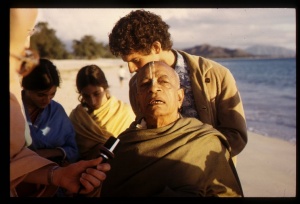CC Madhya 12.215: Difference between revisions
m (1 revision(s)) |
(Vanibot #0054 edit - transform synonyms into clickable links, which search similar occurrences) |
||
| (One intermediate revision by one other user not shown) | |||
| Line 1: | Line 1: | ||
{{ | [[Category:Sri Caitanya-caritamrta - Madhya-lila Chapter 12|C215]] | ||
<div style="float:left">'''[[Sri Caitanya-caritamrta|Śrī Caitanya-caritāmṛta]] - [[CC Madhya|Madhya-līlā]] - [[CC Madhya 12|Chapter 12: The Cleansing of the Guṇḍicā Temple]]'''</div> | |||
<div style="float:right">[[File:Go-previous.png|link=CC Madhya 12.214|Madhya-līlā 12.214]] '''[[CC Madhya 12.214|Madhya-līlā 12.214]] - [[CC Madhya 12.216|Madhya-līlā 12.216]]''' [[File:Go-next.png|link=CC Madhya 12.216|Madhya-līlā 12.216]]</div> | |||
{{CompareVersions|CC|Madhya 12.215|CC 1975|CC 1996}} | |||
{{RandomImage}} | |||
==== TEXT 215 ==== | ==== TEXT 215 ==== | ||
<div | <div class="verse"> | ||
yata piye tata tṛṣṇā bāḍhe nirantara | :yata piye tata tṛṣṇā bāḍhe nirantara | ||
mukhāmbuja chāḍi’ netra nā yāya antara | :mukhāmbuja chāḍi’ netra nā yāya antara | ||
</div> | </div> | ||
| Line 12: | Line 16: | ||
==== SYNONYMS ==== | ==== SYNONYMS ==== | ||
<div | <div class="synonyms"> | ||
''[//vanipedia.org/wiki/Special:VaniSearch?s=yata&tab=syno_o&ds=1 yata]'' — as much; ''[//vanipedia.org/wiki/Special:VaniSearch?s=piye&tab=syno_o&ds=1 piye]'' — ''they drink; ''[//vanipedia.org/wiki/Special:VaniSearch?s=tata&tab=syno_o&ds=1 tata]'' — so much; ''[//vanipedia.org/wiki/Special:VaniSearch?s=tṛṣṇā&tab=syno_o&ds=1 tṛṣṇā]'' — thirst; ''[//vanipedia.org/wiki/Special:VaniSearch?s=bādhe&tab=syno_o&ds=1 bādhe]'' — increases; ''[//vanipedia.org/wiki/Special:VaniSearch?s=nirantara&tab=syno_o&ds=1 nirantara]'' — incessantly; ''[//vanipedia.org/wiki/Special:VaniSearch?s=mukha&tab=syno_o&ds=1 mukha]-[//vanipedia.org/wiki/Special:VaniSearch?s=ambuja&tab=syno_o&ds=1 ambuja]'' — the lotuslike face; ''[//vanipedia.org/wiki/Special:VaniSearch?s=chāḍi’&tab=syno_o&ds=1 chāḍi’]'' — giving up; ''[//vanipedia.org/wiki/Special:VaniSearch?s=netra&tab=syno_o&ds=1 netra]'' — the eyes; ''[//vanipedia.org/wiki/Special:VaniSearch?s=nā&tab=syno_o&ds=1 nā]'' — do not; ''[//vanipedia.org/wiki/Special:VaniSearch?s=yāya&tab=syno_o&ds=1 yāya]'' — go; ''[//vanipedia.org/wiki/Special:VaniSearch?s=antara&tab=syno_o&ds=1 antara]'' — separate. | |||
</div> | </div> | ||
| Line 19: | Line 23: | ||
==== TRANSLATION ==== | ==== TRANSLATION ==== | ||
<div | <div class="translation"> | ||
As their eyes began to drink the nectarean honey of His lotus face, their thirst increased. Thus their eyes did not leave Him. | As their eyes began to drink the nectarean honey of His lotus face, their thirst increased. Thus their eyes did not leave Him. | ||
</div> | </div> | ||
| Line 26: | Line 30: | ||
==== PURPORT ==== | ==== PURPORT ==== | ||
<div | <div class="purport"> | ||
In the Laghu-bhāgavatāmṛta (1.5.538), Śrīla Rūpa Gosvāmī has described the beauty of the Lord in this way: | In the ''Laghu-bhāgavatāmṛta'' (1.5.538), Śrīla Rūpa Gosvāmī has described the beauty of the Lord in this way: | ||
:asamānordhva-mādhurya-taraṅgāmṛta-vāridhiḥ | :asamānordhva-mādhurya-taraṅgāmṛta-vāridhiḥ | ||
| Line 33: | Line 37: | ||
“The beauty of the son of Mahārāja Nanda is incomparable. Nothing is higher than His beauty, and nothing can equal it. His beauty is like waves in an ocean of nectar. This beauty is attractive both for moving and for nonmoving objects.” | “The beauty of the son of Mahārāja Nanda is incomparable. Nothing is higher than His beauty, and nothing can equal it. His beauty is like waves in an ocean of nectar. This beauty is attractive both for moving and for nonmoving objects.” | ||
Similarly, in the tantra-śāstra there is another description of the Lord’s beauty: | Similarly, in the ''tantra-śāstra'' there is another description of the Lord’s beauty: | ||
:kandarpa-koṭy-arbuda-rūpa-śobha- | :kandarpa-koṭy-arbuda-rūpa-śobha- | ||
| Line 43: | Line 47: | ||
One may also consult Śrīmad-Bhāgavatam ([[SB 10.29.14]]) in this connection. | One may also consult Śrīmad-Bhāgavatam ([[SB 10.29.14]]) in this connection. | ||
</div> | </div> | ||
__NOTOC__ | |||
<div style="float:right; clear:both;">[[File:Go-previous.png|link=CC Madhya 12.214|Madhya-līlā 12.214]] '''[[CC Madhya 12.214|Madhya-līlā 12.214]] - [[CC Madhya 12.216|Madhya-līlā 12.216]]''' [[File:Go-next.png|link=CC Madhya 12.216|Madhya-līlā 12.216]]</div> | |||
__NOTOC__ | |||
__NOEDITSECTION__ | |||
Latest revision as of 21:33, 19 February 2024

A.C. Bhaktivedanta Swami Prabhupada
TEXT 215
- yata piye tata tṛṣṇā bāḍhe nirantara
- mukhāmbuja chāḍi’ netra nā yāya antara
SYNONYMS
yata — as much; piye — they drink; tata — so much; tṛṣṇā — thirst; bādhe — increases; nirantara — incessantly; mukha-ambuja — the lotuslike face; chāḍi’ — giving up; netra — the eyes; nā — do not; yāya — go; antara — separate.
TRANSLATION
As their eyes began to drink the nectarean honey of His lotus face, their thirst increased. Thus their eyes did not leave Him.
PURPORT
In the Laghu-bhāgavatāmṛta (1.5.538), Śrīla Rūpa Gosvāmī has described the beauty of the Lord in this way:
- asamānordhva-mādhurya-taraṅgāmṛta-vāridhiḥ
- jaṅgama-sthāvarollāsi-rūpo gopendra-nandanaḥ
“The beauty of the son of Mahārāja Nanda is incomparable. Nothing is higher than His beauty, and nothing can equal it. His beauty is like waves in an ocean of nectar. This beauty is attractive both for moving and for nonmoving objects.” Similarly, in the tantra-śāstra there is another description of the Lord’s beauty:
- kandarpa-koṭy-arbuda-rūpa-śobha-
- nīrājya-pādābja-nakhāñcalasya
- kutrāpy adṛṣṭa-śruta-ramya-kānter
- dhyānaṁ paraṁ nanda-sutasya vakṣye
“I shall relate the supreme meditation upon Lord Śrī Kṛṣṇa, the son of Nanda Mahārāja. The tips of the toes of His lotus feet reflect the beauty of the bodies of unlimited millions of Cupids, and His bodily luster has never been seen or heard of anywhere.” One may also consult Śrīmad-Bhāgavatam (SB 10.29.14) in this connection.